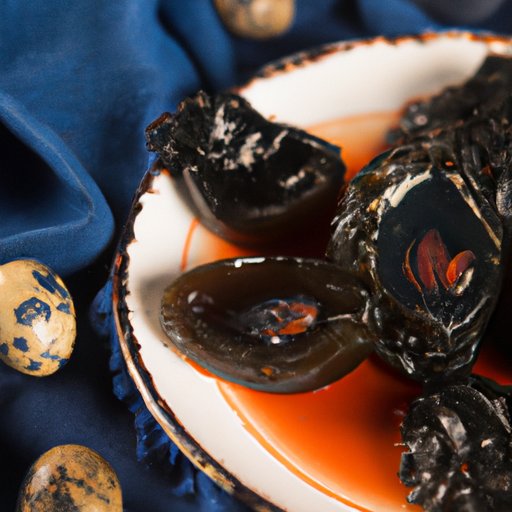Introduction
Perhaps one of the most controversial dishes out there, century eggs (also known as thousand-year-old eggs) have often been the subject of myths and misconceptions. Although commonly eaten in China and other parts of Asia, many people outside of these regions may not be familiar with this delicacy. So what exactly are century eggs, and why are they so controversial?
The Most Controversial Delicacy Explained: All About Century Eggs
Century eggs are preserved eggs that have been soaked in a mixture of clay, ash, salt, quicklime, and rice straw for several weeks to several months. This process results in a translucent, gelatinous egg white and a gray-green or black yolk with a creamy texture and a strong, pungent flavor.
Century eggs are a traditional Chinese food with a history dating back to the Ming Dynasty (1368-1644). In China, century eggs are typically served as a snack or side dish, often paired with pickled ginger and soy sauce.
A Beginner’s Guide to Century Eggs: What They Are and How They’re Made
Century eggs are made by taking fresh duck, chicken, or quail eggs and coating them in a paste made from clay, ash, salt, quicklime, and rice straw. The eggs are then packed into plastic or earthenware containers and left to ferment for several weeks to several months.
During the fermentation process, the alkaline materials penetrate the eggshell and the egg white, which denatures the proteins and causes the egg white to turn translucent while the yolk becomes a darker color. The process also gives the eggs their distinct flavor and aroma.
There are different methods of making century eggs, and the ingredients and preparation process can vary depending on the region and the recipe.
Breaking Down the Myths and Misconceptions of Century Eggs
One of the most common myths about century eggs is that they are made by burying the eggs in horse urine or manure, but this is entirely untrue. While the preservation method may seem unusual to those who are unfamiliar with it, there is nothing unhygienic or unsanitary about it.
Another misconception is that century eggs are poisonous or harmful to eat. In reality, century eggs are safe to eat and are a popular food item throughout Asia.
It is important to note that although century eggs are safe to eat, they are high in sodium and should be consumed in moderation.
From China to the World: The History and Cultural Significance of Century Eggs
Century eggs have been a part of Chinese cuisine for centuries, and they are known for their unique flavor and texture. In Chinese culture, century eggs are often associated with auspicious meanings, such as longevity and prosperity, and they are a common food during Lunar New Year celebrations.
Today, century eggs are enjoyed not just in China but throughout Asia and around the world. They can be found in restaurants and specialty food stores in many countries, and are often incorporated into fusion dishes and modern recipes.
A Culinary Adventure: Trying Century Eggs for the First Time
Trying century eggs for the first time can be a unique and adventurous experience. While the strong flavor and unusual appearance may be off-putting to some, others may find it to be a sophisticated and flavorful delicacy.
When preparing century eggs, it is important to rinse them thoroughly with clean water and remove the outer layer of the egg white. They can be served cold, sliced, and eaten as a snack or used as an ingredient in dishes such as congee, tofu, or salad.
Modern Twists on Traditional Century Egg Recipes You Need to Try Today
While century eggs are traditionally eaten as a snack or side dish, there are a variety of modern recipes that incorporate century eggs into main dishes and desserts. For example, century eggs can be used to make a savory porridge, a spicy salad with minced pork, or a creamy custard.
For those who want to try their hand at cooking with century eggs, there are many DIY recipes available that can inspire new and exciting culinary creations.
Conclusion
While century eggs may not be everyone’s cup of tea, they are a unique and flavorful delicacy with a long cultural history. By understanding the facts and breaking down the myths surrounding century eggs, we can appreciate this food item for what it truly is: a culinary adventure waiting to be explored.
If you’re feeling adventurous and want to try century eggs for yourself, we encourage you to give them a try! And for those who are already fans, we hope this article has provided you with new insights and inspiration for incorporating century eggs into your meals.
